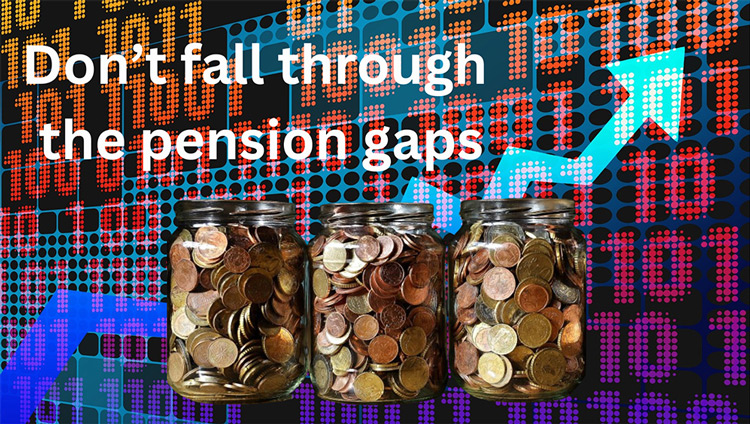Don’t fall through the pension gaps!

It's never too early to start thinking about your pension. There are various parts to your pension income – your state pension and possibly auto-enrolment into a pension scheme offered by your employer and/or a private pension. You need to keep an eye on all of these to ensure you don't end up in retirement struggling to survive.
In an ideal world, you'll have savings and investments that will also provide a retirement income, but we all know people who have lost their savings or fallen on hard times and had to use them to live now, leaving them vulnerable in later life.
The full state pension is due to increase at the beginning of April 2024, but a 'full' state pension means you must have 35 qualifying years of National Insurance (NI) contributions. For a whole variety of reasons, many people fall short, whether it's due to taking time out to raise a family or going overseas to work for an extended period. That means that when pension increases occur they may not get them.
Check now and fill the gap
It's wise to check your National Insurance record and see your pension forecast now – not when you're nearing retirement age. You can fill in gaps in your NI contributions by making voluntary contributions. Normally you can backdate your contributions for up to six years, but, currently, HMRC have extended this back to 2006.
For each year you pay these additional voluntary contributions, you're adding a year to your pension qualification period.
Other pensions
Most employers are required to offer auto-enrolment in a pension scheme, and, unless you opt out, you and your employer will contribute into the scheme, however you will have little control over the growth of the scheme and what level of income it will give you upon retiring.
You make find that choosing your own private pension will give you much better returns and control. A good financial advisor will be able to help you to create a portfolio that is tailored to your risk profile and gives you the best possible return for the amount you want to invest.
We've written about pensions before – a thumbnail of the way the finances work is that, if you own a limited company that is earning profits in excess of £50K and less than 250K putting money into your directors' pensions saves you a considerable amount in Income Tax and reduces Corporation Tax too.
Corporation tax is increasing from the current flat rate of 19% to up to 25% on a sliding scale. If you're a sole director taking money out of the business as dividends you'll pay Corporation Tax on the company profits – AND personal tax at the 33.75% tax rate as soon as your personal income tips over the £50,271 milestone.
But employer pension contributions are a tax free benefit up to a total of £60k per year, per person, and also attract corporation tax relief. However, the money MUST be transferred into a pension, there's no way that this can be a paper exercise.
Potentially this will save paying the 26.5% marginal rate of Corporation Tax plus a further 33.75% of income tax on a dividend if you're a higher rate tax payer. You can draw down 25% of your pension pot when you get to 55 – also tax free.
It's important that you have a personal pension scheme open, even if you are only paying a small amount into it. This is because you can roll your annual £60K allowance forwards for three years, but to do that you need to have the pension scheme open for the period where you want to top up.